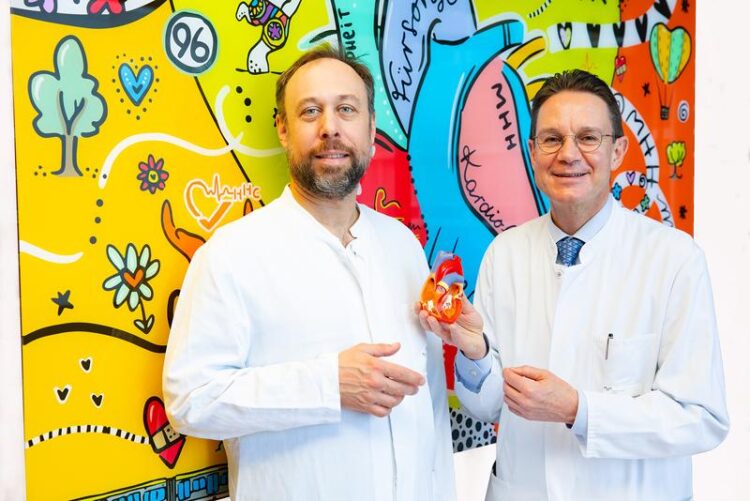Iron deficiency in heart failure: tablet as an alternative to infusion?

Professor Dr. Tibor Kempf (left) and Professor Dr. Johann Bauersachs with a heart model.
Copyright: Karin Kaiser / MHH
MHH cardiology starts the multicentre ORION HF study. She wants to find out whether a preparation in tablet form can correct iron deficiency and alleviate the typical symptoms of heart failure.
People with heart failure, also called heart failure, often have too little iron in the body. Iron deficiency exacerbates the symptoms of heart disease such as shortness of breath, tiredness and weakness. A dose of iron can help those affected. So far, this is done by infusion through the vein. Can the same success be achieved with a special preparation of iron in tablet form? This question is being investigated by the Department of Cardiology and Angiology of the Hannover Medical School (MHH) in the pilot study ORION-HF. The intake of tablets would be better for patients to implement in their daily lives than the administration of iron by infusion. MHH cardiology is coordinating the study, and other German heart centres are involved. The project is funded by the company Norgine with around 670,000 euros.
Iron is important for oxygen transport
Iron plays a very important role: it is needed for the formation of the red blood dye haemoglobin. Hemoglobin is responsible for the distribution of oxygen throughout the body. If iron is missing, it is not possible to produce enough hemoglobin. In addition, iron is needed in every body cell for central mechanisms such as energy production. Iron is very important for the heart and skeletal muscles, as both organs have a high energy requirement. “However, 30 to 50 percent of patients with heart failure have an iron deficiency,” explains Professor Dr. Johann Bauersachs, Director of the Department of Cardiology and Angiology. Professor Bauersachs is leading the pilot study together with Professor Dr. Tibor Kempf, senior physician at the clinic. Iron deficiency in this group of patients can have several causes. These include reduced iron uptake in the intestine and inflammatory processes in the body, which also lead to poorer iron absorption. Another reason may be an increased iron loss, for example due to blood-thinning drugs.
Do tablets increase hemoglobin levels?
To date, there is no iron medication in tablet form that has been proven to cure iron deficiency in patients with heart failure. “The current treatment guidelines only recommend infusions,” says Professor Kempf. In the pilot study ORION-HF, cardiologists are now testing an iron preparation that has already been approved for other diseases. The focus is on the group of patients with so-called left heart failure, i.e. heart failure of the left ventricle. This is the most common form of heart failure, about two to three million people are affected in Germany alone. “We want to find out whether therapy with the tablets leads to an increase in haemoglobin and iron levels in the blood,” explains Professor Kempf. For the patients, this would mean that they would be better supplied with oxygen and suffer less from symptoms such as fatigue, shortness of breath and cough. They would have a much better quality of life.
Study with 50 subjects
At ORION-HF, the Department of Cardiology and Angiology works closely with the Center for Clinical Studies of the MHH. A total of 50 patients with heart failure who suffer from iron deficiency and anemia are enrolled in the study. For a period of 16 weeks, the subjects take an iron tablet in the morning and in the evening. Afterwards, the study doctors examine the effect. “If it turns out that the preparation can compensate for the iron deficiency and the subjects suffer from less severe symptoms, then the tablets would be a safe and uncomplicated alternative to the infusions,” says Professor Bauersachs. All new scientific findings on the subject of heart failure are also incorporated into the work of the Heart Failure Network Lower Saxony (http://www.herz-niedersachsen.de), a consortium of more than 20 heart clinics in Lower Saxony.
SERVICE:
For further information, please contact Professor Dr. Tibor Kempf, kempf.tibor@mh-hannover.de, phone (0511) 532-4503.
Media Contact
All latest news from the category: Health and Medicine
This subject area encompasses research and studies in the field of human medicine.
Among the wide-ranging list of topics covered here are anesthesiology, anatomy, surgery, human genetics, hygiene and environmental medicine, internal medicine, neurology, pharmacology, physiology, urology and dental medicine.
Newest articles

High-energy-density aqueous battery based on halogen multi-electron transfer
Traditional non-aqueous lithium-ion batteries have a high energy density, but their safety is compromised due to the flammable organic electrolytes they utilize. Aqueous batteries use water as the solvent for…

First-ever combined heart pump and pig kidney transplant
…gives new hope to patient with terminal illness. Surgeons at NYU Langone Health performed the first-ever combined mechanical heart pump and gene-edited pig kidney transplant surgery in a 54-year-old woman…

Biophysics: Testing how well biomarkers work
LMU researchers have developed a method to determine how reliably target proteins can be labeled using super-resolution fluorescence microscopy. Modern microscopy techniques make it possible to examine the inner workings…





















